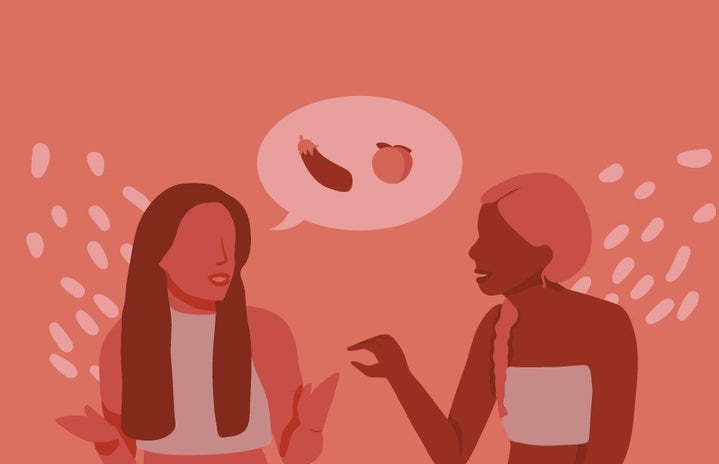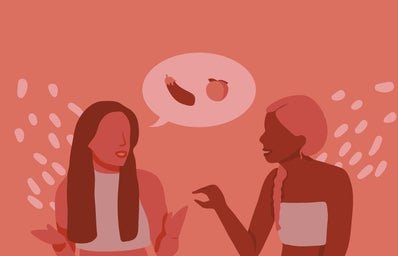Asexuality is a sexual orientation in the LGBTQIA+ community that describes people who experience little to no sexual attraction to others. It’s a very misunderstood sexual orientation, partly due to its lack of representation in mainstream media. Because of this misunderstanding, allosexuals (non-asexual defining people) often say hilarious, strange, and sometimes inappropriate statements, or ask invasive questions. Identifying as asexual myself, I’ve been confronted with some of these comments and questions. So, I’ve compiled a couple of the most common questions I get, and some of my favourites that I’ve gotten over the years that I think are worth sharing and talking about.
If you’re not too sure about what asexuality, the ace-spectrum and the wide variety of sexual identities that fall under the umbrella term ‘asexual’, I wrote an article that explains it all in more detail, which you can find here if you’re curious and would like to know more.
And now, with further delay, here are some things that one preferably shouldn’t say to or ask an asexual:
“Haha, like a plant?”
Don’t get me wrong, I do appreciate a good joke, and this joke isn’t offending me in any way, I’ve just heard this one a countless number of times. There are some pretty good ace jokes online: for example, why did the aroace person leave the fair? Because they couldn’t find any attractions.
Admittingly, dad jokes aren’t for everyone, but I’m just saying, there’s a variety! Make me laugh with some different content, I dare you.
“It’s just a phase”
Ugh, no Mom, this isn’t a phase. It’s true that someone’s sexual identity can change over time while they discover themselves, but this isn’t the case with everybody. This question also sometimes sounds like, “You just haven’t met the right person yet” or “how do you know if you haven’t tried it?” or my personal favourite (sarcasm) “you’re too young to know”.
These types of questions and statements are well known to the LGBTQ+ community and usually come from homophobic Karens, (which I’m sure you aren’t, my dear reader). While well-meaning, these statements and questions can often come across as patronizing and make people feel invalidated. It also implies that our identities are immature. Also, Karen, would you tell a straight person that it’s “just a phase?” No? I didn’t think so.
“That’s just a fancy way of saying that you’re celibate”
This is a common misconception about asexuality, but there is a difference between asexuality and celibacy. Celibacy refers to the choice to abstain from sex, but there is usually still a desire for sexual intimacy. Asexuality, on the other hand, isn’t a choice to abstain from sex but is rather a lack of feeling of sexual attraction. There are also some aces who choose to still have sex, whether it be because they are sex-positive or sex-neutral, or for several other reasons. The biggest difference between celibacy and asexuality is that in celibacy, refraining from sex is a choice, whereas if an asexual person abstains from sex, it’s due to a lack of sexual attraction, which isn’t a choice. Asexuality is a sexual orientation, whereas celibacy is a behaviour.
“But isn’t everybody demi-sexual?”
This one is more specific to demi-sexuals. Those who identify as demi-sexual only feel sexual attraction to people once they’ve established a strong emotional and personal connection to the other person. When coming out, a lot of demisexuals are confronted with statements such as “isn’t everybody demi-sexual?” A friend of mine received a lot of backlash for labelling themselves as demi-sexual, as many people don’t want to have sex with others if they haven’t established an emotional connection first. But the difference is that demi-sexuals feel no attraction to people until they’ve established an emotional bond, whereas, for other people, it is a choice to withhold intimacy until they’ve gotten to know their partner better. In other words, what makes demi-sexuality different to allosexual people is the lack of sexual attraction.
I’ve also seen people ask this question with the words “so you’re normal then?” and I wanted to explain why this choice of words can be harmful. The word “normal” implies that demi-sexuals are strange or abnormal, and this can make people feel insecure in their identity like they need to be “fixed” when in reality it is completely normal and isn’t as uncommon as many people believe. An estimated 1% of the world population identifies as demi-sexual or as asexual, which is a significant amount of people. Furthermore, having a label for one’s sexual identity can give them a sense of belonging after having felt out of place in an allosexual-dominated world, and I think it’s important not to discourage that.
“You shouldn’t tell people that. Nobody is going to want to date you”
This is something that a lot of aces struggle with when entering the world of romance. I touched on this issue in my article on dating as an asexual, as aces often struggle to start dating in a world that is dominated by allosexuals. If you’d like to know a bit more about what it’s like to date as an asexual person or if you’d like some more info on romantic orientations and the differences between being sex-positive, sex-neural or sex-averse I’d recommend checking it out (wink wink, nudge nudge): https://www.hercampus.com/school/uct/dating-from-the-perspective-of-an-asexual/
Aces often go through periods of self-hatred due to feeling unlovable because of their sexual orientation. I remember a friend once told me, “I feel sorry for your partner”, and while they meant it in a joking way, it made me feel guilty about my sexual identity, and I felt like I was a burden to my partner. In reality, there are plenty of demi-sexuals or asexuals that are open to dating as well as people who don’t see sex as an important aspect of their romantic relationships. My point is, that there are lots of options for asexuals or demi-sexuals who want to date, and that shouldn’t be discouraged by comments such as this one.
“I could change that”
Oh, my goodness, how do I even begin unpacking this one? I received this sort of question in my short-lived, but incredibly entertaining experience on Tinder. These sorts of comments can also sound like, or “let me fix that for you” or “you just haven’t experienced me yet” or “challenge accepted!” and, if they’re in text form, are usually followed by a series of winky faces and other more suggestive emojis. First of all, no, you won’t be able to change that. My sexuality isn’t a choice, and I’m comfortable enough with my sexuality that I don’t feel the desire to try and deny it. Second of all, I don’t think that message had the desired effect you wanted it to have. I’m sure you’re expecting me to be blushing, thinking oh wow, this person seems so endearing. Instead, I had actually been laughing at your text for the past 10 minutes because of how much of a terrible red flag that line was.
But in all seriousness, these types of messages aren’t always just funny anecdotes you can share with your friends to show them how hilariously out of touch some people can be. It can also be incredibly confusing for someone who is coming to terms with their asexuality, as the legitimacy of their identity is being brought into question with a statement like that. It suggests that asexuality is something that needs to be “fixed” by having good sex with someone, and that’s just not what asexuality is about at all. People aren’t asexual because they don’t enjoy sex, it’s because they don’t experience sexual attraction. A comment like this can also come across as very threatening and scary, so it is best to avoid making jokes about this sort of thing in general, not just for those who identify on the ace-spectrum.
Overall, if you’re wanting to ask your friendly neighbourhood ace some questions about sexuality, that’s totally okay! But if you’re being gross on Tinder, maybe rethink your pick up line, and send a good joke instead.


